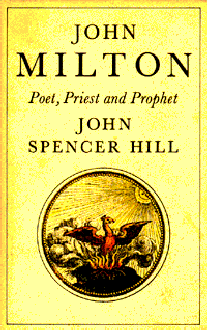John Milton: Poet, Priest and Prophet
A Study of Divine Vocation in Milton's Poetry and Prose
John Spencer Hill

Publication Data
Hardcover (Britain)
London: Macmillan Press, 1979
ISBN: 0-333-23768-4
228 pages + index
The jacket design incorporates the Phoenix emblem from J.Camerarius, Symbolorum et Emblematum (Nürnberg, 1590-94), Emblem 100.
Jacket Blurb
Perhaps Milton's firmest conviction was that he had been called to serve as an instrument of the divine will. Like the Nazarite Samson, into whose characterization he poured a good deal of his own spiritual and intellectual biography, he thought of himself as "a person separate to God,/ Designed for great exploits" and his sense of special vocation provides a conceptual framework which unifies the whole of his literary production.After an examination, in the Introduction, of Milton's use and understanding of the term "vocation" (especially in De Doctrina Christiana), Dr Hill traces an evolving awareness of calling in the early poetry and the prose works. The early years are devoted largely to vocational definition: called to serve God from the pulpit and through poetry, Milton concentrates on the proper use of his divinely implanted talents and on defining his requirements as God's poet-priest. In the prose works of 1641 to 1660 the vocational emphasis shifts from his role as poet-priest to his role as poet-prophet. All the signs, it seemed, declared that England was destined to be the new Israel, and Milton's special vocation was to serve, both in prose and verse, as the prophet of national reformation. It was in this mood--apocalyptic and buoyantly optimistic at first, but later despairing and pessimistic--that Paradise Lost was conceived and begun.
The failure of the Puritan experiment at the Restoration in 1660 necessitated a period of vocational reassessment--a theme which is central in the poems published in 1667 and 1671 and especially in Samson Agonistes which, Dr Hill argues, was composed in 1660-1. Each of Milton's protagonists in the later poetry--Adam, Samson and Christ--is educated in the limits of human power and the vocational expectations imposed on him by divine service; each learns, as Milton himself had learned, what is involved in serving as the special instrument of God. Adam is instructed in Paradise Lost in his responsibilities as the father of mankind, first in a state of prelapsarian perfection where he is invited to ascend toward God by his own merit, and later in a fallen world of his own making where salvation is possible only through Christ's imputed merit. In Samson Agonistes the protagonist, fallen from favour and close to despair as the play begins, is led to redefine his special status as an instrument of God and is enabled, with divine aid, to resolve the vocational tension between prophecy and fact in his promised role as Israel's deliverer; and in Paradise Regained the Son is led, through temptation, to a precise understanding of his messianic vocation.
Preface
Abbreviations
Introduction: The Theology of Vocatio (89k)
1. Ministerial Vocation, 1625-40 (80k)
2. Poetic Vocation, 1628-42 (78k)
3. Prophetic Vocation, 1641-60 (120k)
4. Paradise Lost (112k)
5. Samson Agonistes (65k)
6. Paradise Regained (50k)
Appendix: Milton Agonistes--The Date
of Samson Agonistes (31k)
 Feel free to drop me a line.
Feel free to drop me a line.
